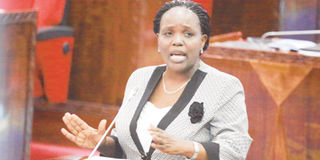Tanzania’s education system needs reform, minister says

Minister for Education, Science, Technology and Vocational Training Joyce Ndalichako delivers her ministry’s Budget for 2016|17 in Dodoma. The government is currently spending about Sh25 billion per month to cover the basic learning costs under the free education programme. PHOTO | FILE
What you need to know:
- The Minister for Education, Science, Technology and Vocational Training, Prof Joyce Ndalichako, says the sector was facing many setbacks that inhibit it from providing much needed quality knowledge.
Dodoma. The Tanzanian education system needs reform so as produce skilled and competent personnel who will transform the country into the middle-income status by 2025.
The Minister for Education, Science, Technology and Vocational Training, Prof Joyce Ndalichako, says the sector was facing many setbacks that inhibit it from providing much needed quality knowledge.
She was speaking when closing a two-day education conference which was organised by the Aga Khan University (AKU)–Institute for Educational Development, East Africa (IED, EA).
“We are grappling with several hurdles at providing quality education from grass root levels. Nearly all public primary and secondary schools throughout the country lack the necessary facilities such as equipped laboratories, libraries. We also have an acute shortage of science teachers,” she said.
She said despite concerted efforts made by the government to scale up the educational budgetary allocation to the tune of Sh4.77 trillion (which accounts for 22.1 per cent of national budget) in this fiscal year, much was still needed to uplift the quality of the sector.
“However, I am very delighted and I commend efforts demonstrated by Aga Khan University Institute for Educational Development for taking centre-stage in making education in Tanzania a priority. The conference has been of immense value in assisting the government to collect lofty ideas on how best to strengthen the education sector,” she observed.
Under the theme, “Education Challenges and Opportunities in Tanzania in the Era of Globalisation”, the educative event led by associate professor from the University of Dar es Salaam Kitila Mkumbo attracted more than 100 education stakeholders from local government officials, civil societies, educational scholars, academicians, gender and equality specialists from Uganda and Kenya.
At the conference, panelists discussed in detail how to address challenges, strength and opportunities in a fresh bid to raise the quality of education in the era of globalisation.
The Minister in the President’s Office (Regional Administration and Local Government), Mr George Simbachawene, said there are two major challenges facing the education sector in Tanzania: “One is limited access to education for all and the second is poor quality of our education,”
He noted that the county was facing an acute shortage of public schools, colleges and universities compared to the number of qualified students.
“The government is currently spending about Sh25 billion per month to cover the basic education costs under the free education programme. But the major immediate outstanding results are a high turnout of pupils who had joined standard one this year. In January a total of 1,896,584 pupils were enrolled compared to 1,028,021 enrolled in 2015,” said Mr Simbachawene.
He added that there is at least 5,047shortage of science laboratories in the country and 69,220 shortage of teachers’ houses in primary and secondary schools respectively.
“The number of classroom today is 108,491, which means, we are still short of about 127,745 and 10,204 for primary and secondary schools,” he said.
AKU-IED, EA director Joe Lugalla underscored the need for the private -public partnership (PPP) so as to improve the performance and quality of the education sector by addressing the identified challenges.
“That means we are seeking insights from a wide range of stakeholders, this is why we have brought together diverse groups of participants at this conference.
“And this gathering is just a beginning…..we need to stand together, think together, deliberate together and finally implement together,” said Prof Lugalla, adding:
“We need an education system that encompasses and equips skills for competencies in a global competitive workforce, and the one that creates think tanks enriched with curiosity and innovative minds,”
Established in 1983, the Aga Khan University (AKU) is an international, non-profit, non-religious educational institution which is committed to develop human resources through the discovery, dissemination and application of knowledge.
The university has campuses and programmes in six countries and nearly 2,500 students as well as more than 13,000 alumni.




